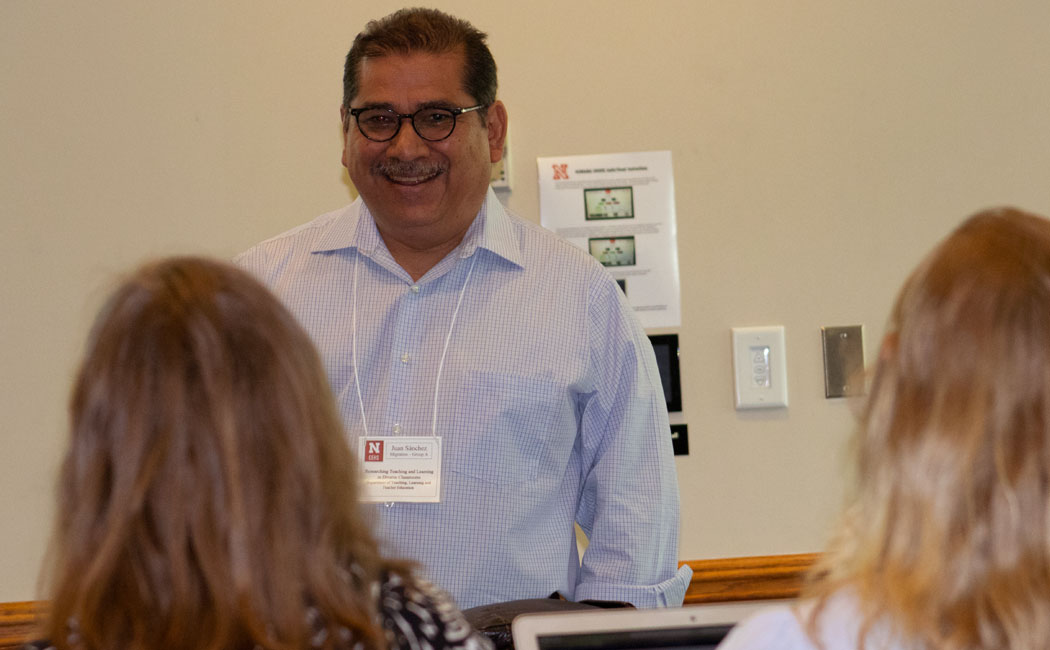
Educators and researchers from four continents gathered in Lincoln Aug. 6-8 to share ideas and collaborate on the future of teaching and learning in increasingly diverse classroom environments.
Sponsored by CEHS’ Department of Teaching, Learning and Teacher Education, the conference highlighted the M3 initiative, known as “M cubed.” About 40 attendees from seven countries met at the University of Nebraska–Lincoln to discuss the three “M’s” — migration, multilingualism and multiculturalism — at the International Collaborative Research Conference and Seminar on Researching, Teaching and Learning in Diverse Classrooms.
“This conference is designed to provide a forum for scholars of immigration, multiculturalism and multilingual education to share our work, to make connections to other researchers and educators, and to leave after these three days with a new and expanded community of colleagues from around the world,” said Jenelle Reeves, TLTE associate professor.
Along with educators and researchers from UNL and other American universities, the conference included attendees from institutions of higher education in China, Finland, Germany, Mexico, The Netherlands and South Africa. The event’s first two days took place in the Nebraska Union's Heritage Room before wrapping in Teachers College on the final day. At the end of the conference’s opening day, attendees enjoyed dinner and conversation at the Spring Creek Prairie Audubon Center in Denton, catered by Yes Chef Catering.
The event was framed around three plenary sessions, dedicated to multilingual, multicultural and migrant issues in education. After each session’s research was presented, attendees discussed the information and collaborated on ideas. Each day also included “ignite sessions,” during which individual attendees highlighted their research in five-minute presentations, followed by questions and answers.
The conference’s first day focused on multilingualism and migration of students and their families, and how they affect teaching and learning. The migration presentation was led by Ted Hamann, TLTE professor; Víctor Zúñiga, professor at Tecnologico de Monterrey in Mexico; and Juan Sánchez of Mexico’s Instituto de Investigación, Innovación y Estudios de Posgrado para la Educación.
Zúñiga noted that about 1 million children born in the United States now live in Mexico. A girl born in Omaha who moves to Mexico, for example, becomes another Mexican student because of her name, he said. But her experiences are significantly different than those of her classmates.
“Schools, teachers and principals who serve international migrant students need to create schools that welcome migratory students,” Zúñiga said. “They need to value the competencies of migrant students.”
Sánchez said that because student mobility can be invisible, teachers need to know their students’ stories.
“Migration, linguistics and culture interact together,” he said. “If we do not see transnational students’ experiences, we fail to see their full humanity.”
The multilingual session was led by Kara Viesca, TLTE associate professor, along with Jenni Alisaari of the University of Turku, Finland, and Emmanuel Acquah, from Finland’s Åbo Akademi University. The presentation shared research from their study, “Observations of Pedagogical Excellence in Teaching Across Nations (OPETAN),” which observed 32 classrooms in four countries — England, Finland, Germany and the United States.
Observations were standardized for all four countries, Viesca said, and focused on six standards for effective outcomes: joint productive activity, with students and teachers producing together; language and literacy development across the curriculum; connecting school to students’ lives; teaching complex thinking; teaching through conversation; and teaching to transform society’s inequities.
The study’s preliminary findings show that teachers who use three or more of these standards have higher positive outcomes.
The multiculturalism section on the second day covered issues stemming from race and gender privilege. The presentation, “Exploring Privilege, Positionality and Possibility in Multicultural Education,” was led by Reeves and Monique Leygraaf, professor at the iPabo University of Applied Sciences in Amsterdam. The session focused on how racial and gender privilege is taught and, at times, obscured.
Reeves, who grew up in rural Iowa, recalled meeting years ago a summer school classmate from Vietnam, who told her about his journey to the United States — and the tragic loss of some of his family members along the way.
“As a white woman, I’m not particularly ‘un-privileged,’” Reeves said. “But my privilege came into sharp focus that day.”
Leygraaf said her country, The Netherlands, has an extensive colonial history. New York City, for example, was originally founded as a Dutch settlement called New Amsterdam. Today, she said, there is ongoing debate among black Dutch citizens about white privilege, and skepticism among many Dutch citizens about how quickly and readily some people claim discrimination or prejudice.
Reeves and Leygraaf noted how easily privilege can become invisible to some teacher candidates, and how it can be obscured through the media, teaching, and school and government policies.
The conference’s final day featured small group breakouts and additional collaboration on ways to continue driving positive impacts on teaching and learning.
CEHS Dean Beth Doll said migration and immigration are key elements of Nebraska’s history, and that such topics are crucial to the future of the state and the country.
“Nebraska has some of the most rapidly changing demographics of any state, and we need to find a way to make this a success for all the children in all our schools,” she told attendees. “I’m delighted you have come to help us figure this out.”